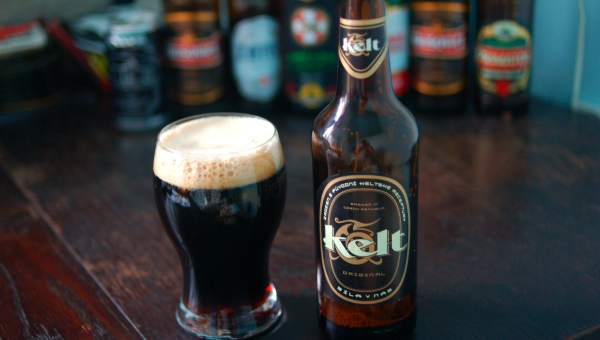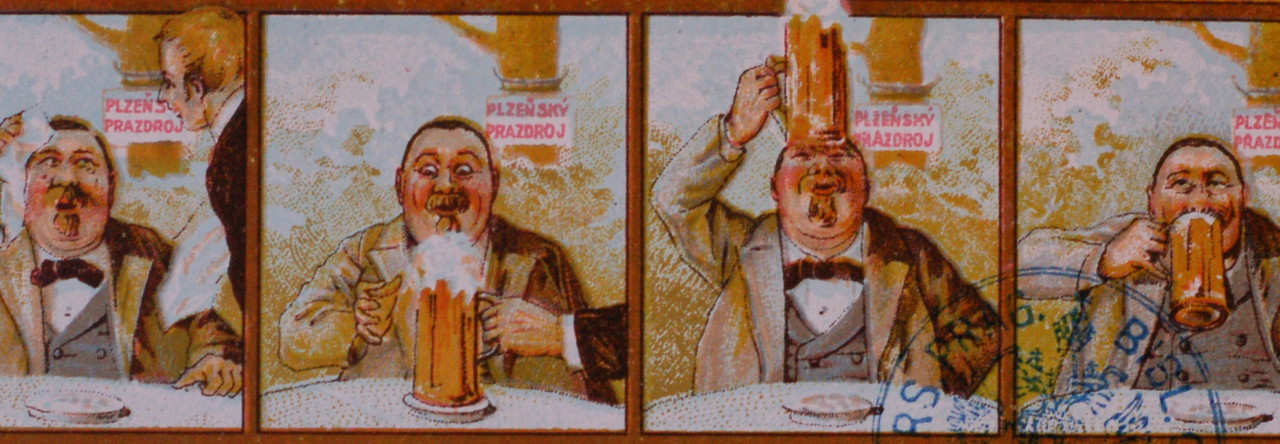
The big news last week: pivni.info (and others) reported that Pivovary Staropramen, the Anheuser-Busch InBev powerhouse in the Czech Republic, was cutting Kelt.
Marketed under the tag line “[the] strength in us,” and said to be “born of the original Celtic recipe,” Kelt was one of many products that played upon the Czech Republic’s affinity for things Gaelic. (If you’ve ever seen the slightly confused, kilt-wearing hibernophiles in Prague, you know what I’m talking about.) Bohemia, after all, is named after the Boii, a Celtic tribe who were resident here in Roman times. The Czechs love beer long time. Why shouldn’t they have their own domestic version of Guinness?
So for about 10 years, they had Kelt, a beer that, head-to-head, often tasted much better than the Guinness you could buy in bottles in central Europe. At less than half the price, and that was for a full half-liter portion of Kelt, versus a 330-milliliter bottle of Ireland’s black blood.
Pay no attention to the fact that I completely ignored Kelt when I wrote about the arrival of Primátor’s excellent Stout: I actually thought it was pretty good. It seemed that others did as well, but recently interest has fallen: the beer achieved its greatest volume of sales in 2004.
The money quote from Staropramen: “We see greater potential in our other brands.”
Though production of Kelt was finished this spring (and the beer has already been de-listed from Pivovary Staropramen’s web page), the beer is still available in shops, and should be around for a while. The bottle I bought today is labeled “Good until October 23, 2009.”
I usually found it to be pretty okay, with a nice roasted barley note, though kind of thin in the mouth. Was that due to the ingredients?

Let your eye fall on “maltózový sirup,” meaning “maltose syrup” and probably made from corn, which is listed as Kelt’s second ingredient after water. The third ingredient is roasted barley, followed by “Czech” barley malt, meaning Pilsner malt, and caramel malt, then hop extract and nitrogen.
Not exactly a confidence-building list, but I would say that the beer itself transcended the sum of its parts. You could often find Kelt in crappy supermarkets that didn’t have a great beer selection. You could find it in pubs that otherwise only served Staropramen. It was at least something different, and yet affordable, that you could pick up when the only other options were boring (or bad) pale lagers. I often found myself feeling grateful to Kelt for just those reasons. Like Staropramen’s Millennium, later known as Granát, it probably helped break ground for other, better beers to follow.
Godspeed, Kelt. I’m raising a glass of Primátor Stout to you tonight.




David
This is a shame; whilst not the greatest beers on the market neither was it one of the worst. Primátor Stout sounds like a good way to send it off
Pivní Filosof
And it was perhaps the only decent product of Staropramen out there…. Pity…
Evan Rail
I think Ostravar is pretty good. A lot of people don’t know it’s still made in traditional open fermenters.
Velky Al
That is a shame, though I wonder how much of the drop off in sales was due to the emergence of Primator’s vastly superior product? Even so, I enjoyed many a Kelt when having a hankering for Guinness and not prepared to pay stupid prices in Prague’s Oirish pubs.
Pivní Filosof
There is one thing I didn’t notice until later.
Sales of Kelt peaked in 2004. That is the same year that InterBrew (then owners of Staropramen) merged with the Brazilian AmBev to become InBev. About that time is when Stella Artois started to be pushed more agressively in market. Can that be a coincidence?
gnoff
That is bad news :(
I’ve always enjoyed going to Hells Bells in Prague and having a full night of drinking Kelt, which I think is an amazing beer when served right.
TERRY
Very sad. Enjoyed Kelt in Hotel Ubranni. Wondered what had happened to it. Cannot wait for first bottle of Primator, next month.
Chris Shallow
I agree; a great pity. The only interesting beer that Staropramen brewed (I believe it was a Bass invention when Bass still owned the company). I suspect that once the Belgians took over they decided to push Stella Artois and their range of bottled beers, instead. If Heineken buys Staro then the Belgian beers will go. Hmm . . maybe Heineken can be persuaded to reinstate Kelt and market outside the Czech Lands as well?
Chris Shallow
Incidentally, there is a Slovak Kelt too. Originally it was a pretty good 12 degreee ‘blonde beer’ in swing-top bottles but Heineken axed it in favour of promoting 12 degree Zlaty Bazant (now brewed in Brno for the Czech market) with 10 degree Kelt as the session alternative (both in standard bottles), a bit like PU and Gambac are paired, here.
Rev. Feedback
Just returned from a month-long pilgrimage to receive this devastating news. Bad omen. Before reading your article I had wandered two different large supermarkets looking for a certain dark beer, wondering how they both could be disappointing the Kelt cult (the brand name of high value to us neo- and pseudo-pagans). Moreover it was a very good brew and there is nothing on the larger market to compare to it. Even fair-sized supermarkets offer only light lagers; anything darker than the lousy caramel-flavored Krusovice so-called dark is imported from Ireland. Having returned from foreign lands where minds are continually opening (Denmark is having a beer renaissance similar to the microbrewery explosion in the USA of the 1980s), this seems a sign that the Czech beer populace is stagnating into monotony & timidity, marked by dulled curiousity and duller taste buds.
N1tr0
Hail to all Kelt-fans!
It’s a shame, that we lose a Kelt beer. This was, probably, the best beer in the world.
Maybe we can send a collective mail to Staropramen (or Heineken) brewery with a request to start this brand again?
I know, that chances are really low (almost invisible), but the greatest beer in the world deserve it’s chance for life!
Mark H.
Kelt was a nice alternative to mega expensive Guinness, in Prague and thereabouts.
Although Kelt was a bit thin, sometimes a much needed alternative to lager was required, and Kelt did the job.
Shame it’s gone, but at least it has a replacement in Primator stout, which I have yet to try.